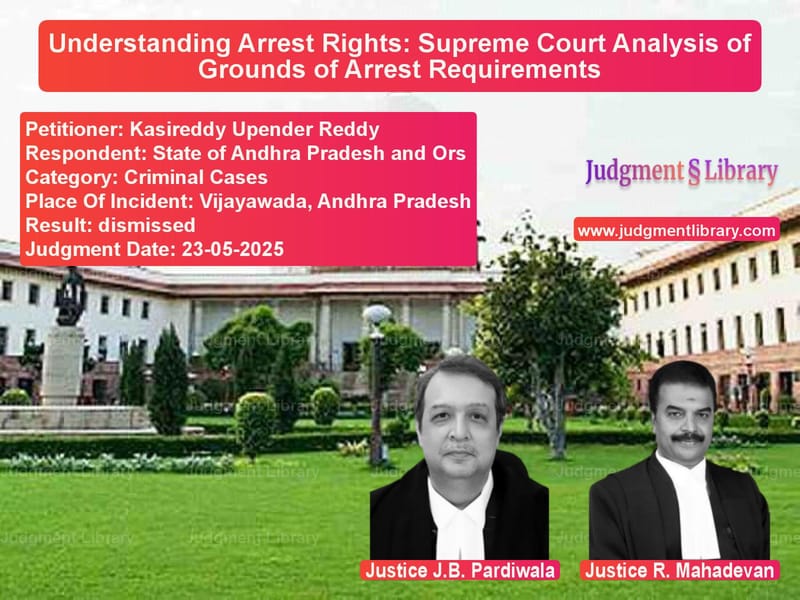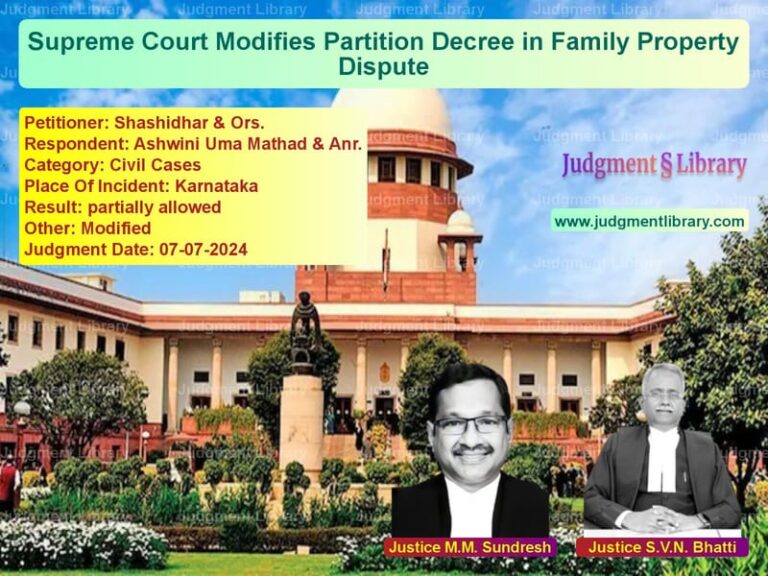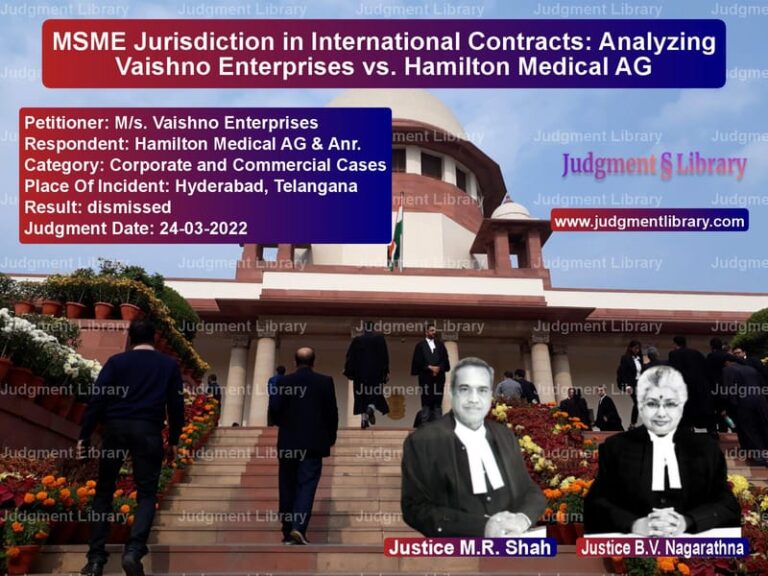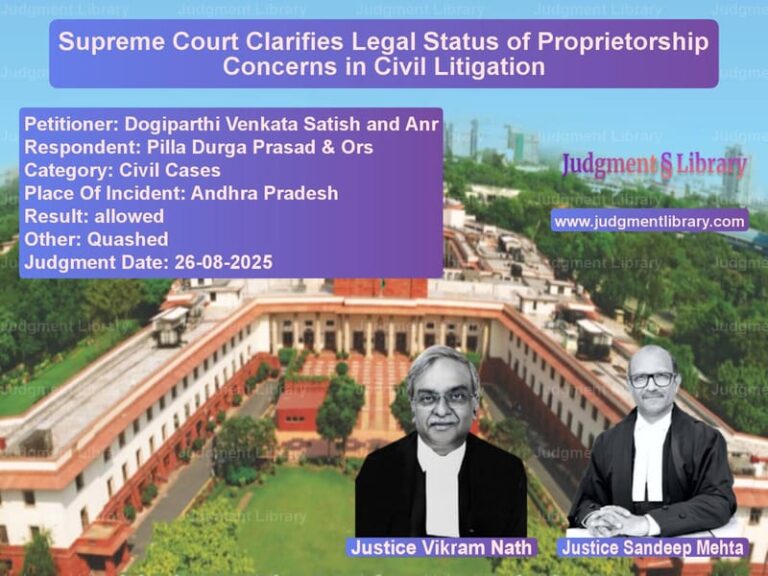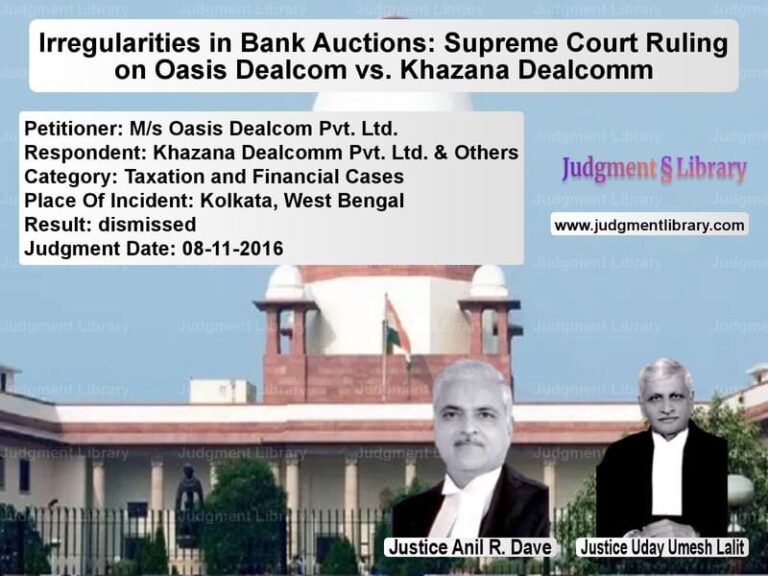Understanding Arrest Rights: Supreme Court Analysis of Grounds of Arrest Requirements
The corridors of justice witnessed another significant chapter in the protection of individual liberties as the Supreme Court of India delivered a crucial judgment addressing the fundamental rights of arrested persons. The case of Kasireddy Upender Reddy versus the State of Andhra Pradesh revolved around a father’s desperate plea for his son’s freedom, challenging what he claimed was an illegal arrest and detention.
The emotional backdrop of this legal battle began when Kessireddy Raja Shekhar Reddy, the appellant’s son, was arrested on April 21, 2025, at Hyderabad Airport. The arrest was made in connection with Crime No. 21 of 2024 registered with the CID Police Station in Mangalagiri. The case involved allegations of conspiracy, cheating, and criminal breach of trust under Sections 420, 409 read with Section 120-B of the Indian Penal Code, which correspond to Sections 318, 316(5) read with Section 61(2) of the newly enacted Bharatiya Nyaya Sanhita, 2023.
The appellant, a distressed father, approached the Andhra Pradesh High Court seeking a writ of habeas corpus – a legal remedy that literally means ‘produce the body’ – arguing that his son’s arrest was fundamentally illegal and therefore his continued detention violated Article 21 of the Constitution, which protects life and personal liberty. However, the High Court dismissed his petition, leading to this appeal before the Supreme Court.
Read also: https://judgmentlibrary.com/cbi-cotton-msp-fraud-case-supreme-court-sets-aside-discharge-of-accused/
The Core Legal Question
At the heart of this legal battle was whether the arrest of the appellant’s son could be considered ‘per se illegal’ due to the alleged failure to supply appropriate and meaningful grounds of arrest. The case presented an opportunity for the Supreme Court to elaborate on the constitutional safeguards against arbitrary arrest and detention.
The appellant’s counsel, Mr. Mahesh Jethmalani, mounted a multi-pronged attack on the legality of the arrest. His written submissions presented a compelling narrative of alleged procedural irregularities and constitutional violations.
Mr. Jethmalani argued that the accused had been responding to notices under Section 179 of the BNSS and had even sent a WhatsApp message to the Investigating Officer stating he would appear the next day. He emphasized that the petitioner’s son was never cited as an accused in the FIR and was treated as a witness until his sudden arrest. “The Petitioner’s son was not an accused person at the time of his arrest on 21.04.2025 and there was no evidence of his complicity in any crime,” he contended.
Perhaps the most serious allegation concerned events during interrogation. The appellant claimed that during investigation, his son was pressured to implicate the then Chief Minister of Andhra Pradesh, Shri Y. S. Jagan Mohan Reddy, in alleged illegalities concerning the liquor excise policy. Shockingly, the remand application revealed the presence of two ‘mediators’ during interrogation, and that the accused had refused to sign an alleged confession. “The entire conspectus of facts that transpired during interrogation discloses glaring illegalities, including the presence of the ‘mediators’. The fact that the Petitioner’s son refused to sign the alleged ‘confession’ is clear proof that he was being forced to make a confession, which he refused,” the submission stated.
The legal arguments focused intensely on the adequacy of the grounds of arrest. Mr. Jethmalani argued that the grounds provided were in total non-compliance with Article 22 of the Constitution and Section 47 of the BNSS. He pointed out that while the section numbers of offences were mentioned, the essential ingredients of those offences were completely absent. “Thus, in so far as Section 409 IPC is concerned, there is not a whisper about the ingredient of entrustment, the property entrusted and the manner of misappropriation or conversion to the accused’s use. Similarly, as far as Section 420 IPC is concerned, the ingredients of deception, fraudulent or dishonest inducement and the property delivered pursuant to such inducement are all significantly absent,” he submitted.
The timing of providing legal documents also came under scrutiny. The counsel argued that the remand report, which contained additional offences under the Prevention of Corruption Act, was served only on April 22, 2025, thereby violating the constitutional mandate of informing grounds of arrest ‘as soon as may be’ and the statutory requirement of ‘forthwith’ communication under Section 47 of BNSS.
Furthermore, the invocation of offences under the Prevention of Corruption Act was challenged as illegal due to the absence of requisite sanction under Section 17A of the Act. The submission noted that the sanction obtained was specifically for another public servant and not for the appellant’s son, violating the established procedure that requires separate proposals for each public servant.
The State’s Defense
Opposing the appeal, Mr. Siddharth Luthra, appearing for the State of Andhra Pradesh, presented a robust defense of the arrest procedures. His written submissions methodically countered each of the appellant’s arguments.
The State emphasized that the accused was arrayed as A1 by way of an entry in the Case Diary on April 19, 2025, before his arrest. At the time of arrest on April 21, 2025, grounds of arrest were supplied to him and also served on his father. “A perusal of the said Grounds of Arrest would show complete compliance with the directions in Vihaan Kumar v. State of Haryana; 2025 SCCOnLine SC 269 @ Para21, wherein this Hon’ble Court directed that information of grounds of arrest must be provided ‘in such a manner that sufficient knowledge of the basic facts constituting the grounds is imparted and communicated to the arrested person…'” the State argued.
The procedural compliance was highlighted – the accused was brought to Vijayawada and produced before the jurisdictional magistrate at 5:15 PM on April 22, 2025, well within the 24-hour period mandated by Article 22(2) of the Constitution. The State noted that the Magistrate had specifically recorded that the accused stated he had not been ill-treated in custody and had received the Remand Report with enclosures.
Regarding the argument about jurisdictional magistrate, the State relied on established precedents including State of U.P. v. Abdul Samad and Gautam Navlakha v. NIA, emphasizing that the requirement is to produce the arrestee before the jurisdictional magistrate within 24 hours, which was duly complied with.
On the crucial issue of Section 17A of the Prevention of Corruption Act, the State presented a different narrative. They argued that approval under Section 17A was granted on April 21, 2025, for a co-accused, and that the appellant’s son, being merely an ‘IT Advisor’ to the Government, had no relation to the excise/liquor policy under investigation. “In the present case, the allegations against A1 with respect to the perpetration of the liquor scam are in no way relatable to his function as an IT Advisor; therefore there is no requirement for approval under Section 17A of the Prevention of Corruption Act,” the State contended.
The Constitutional Framework
The Supreme Court, in its analysis, began by examining the constitutional provisions at the heart of this case. Article 21 of the Constitution states: “No person shall be deprived of his life or personal liberty except according to procedure established by law.” Article 22 provides specific protections against arrest and detention, mandating that “No person who is arrested shall be detained in custody without being informed, as soon as may be, of the grounds for such arrest nor shall he be denied the right to consult, and to be defended by, a legal practitioner of his choice.”
The Court also examined Section 47 of the BNSS, which requires that “Every police officer or other person arresting any person without warrant shall forthwith communicate to him full particulars of the offence for which he is arrested or other grounds for such arrest.” Section 48 of BNSS further obligates the police to inform a relative or friend about the arrest.
The grounds of arrest provided to the appellant’s son were extensively quoted in the judgment. They described the case as one of “Conspiracy, Cheating, Criminal breach of trust, Corruption and Money Laundering which caused huge wrongful loss to the state exchequer/Distilleries and wrongful gain to influential individuals/Few Distilleries/Few Suppliers to a tune of more than Rs. 3200 Crores.” The specific allegations included that the accused was “the key person in organizing the kickback driven liquor trade in AP during 2019-2024” and that he had “controlled issuance of OFSS to suppliers based on kickbacks received.”
The Vihaan Kumar Precedent
The judgment extensively referenced the Court’s recent landmark decision in Vihaan Kumar v. State of Haryana, which Justice J.B. Pardiwala described as “a pivotal reference point in Indian jurisprudence regarding the rights of individuals upon arrest.” The Court noted that Vihaan Kumar “underscores the judiciary’s commitment to upholding constitutional protections against arbitrary arrest and detention.”
The Court reproduced significant portions from Vihaan Kumar, where Justice Abhay S. Oka had eloquently explained the constitutional mandate: “Therefore, as far as Article 22(1) is concerned, compliance can be made by communicating sufficient knowledge of the basic facts constituting the grounds of arrest to the person arrested. The grounds should be effectively and fully communicated to the arrestee in the manner in which he will fully understand the same.”
Justice Oka had emphasized that “the requirement of informing the person arrested of the grounds of arrest is not a formality but a mandatory constitutional requirement.” He further explained the intimate connection between Articles 21 and 22: “Once a person is arrested, his right to liberty under Article 21 is curtailed. When such an important fundamental right is curtailed, it is necessary that the person concerned must understand on what grounds he has been arrested.”
The consequences of non-compliance were clearly stated: “On the failure to comply with the requirement of informing grounds of arrest as soon as may be after the arrest, the arrest is vitiated. Once the arrest is held to be vitiated, the person arrested cannot remain in custody even for a second.”
Justice N. Kotiswar Singh, in his concurring opinion in Vihaan Kumar, had added important dimensions to the understanding of arrest procedures: “The purpose of inserting Section 50A of the CrPC, making it obligatory on the person making arrest to inform about the arrest to the friends, relatives or persons nominated by the arrested person, is to ensure that they would able to take immediate and prompt actions to secure the release of the arrested person as permissible under the law.”
The Court summarized the principles established in Vihaan Kumar, which included that the requirement of informing grounds of arrest is a mandatory constitutional condition; the mode of communication must be meaningful; non-compliance vitiates the arrest; the burden of proving compliance rests on the police; and grounds must be provided not only to the arrestee but also to family members to enable them to secure release.
Application to the Present Case
The Court made an important clarification about the scope of its inquiry: “In Vihaan Kumar (supra) the case was that there was an absolute failure on the part of the police to provide the grounds of arrest. In the case at hand, it is not in dispute that the grounds of arrest were supplied to the arrestee, however, the case put up is that those grounds are not meaningful and are bereft of necessary essential information.”
The Court’s endeavor was to determine whether the grounds of arrest supplied were “meaningful and sufficient enough to give a broad idea to the person arrested of the accusations levelled and as to why he was being taken into custody.”
After examining the grounds of arrest, the Court reached a definitive conclusion: “Having looked into the grounds of arrest which were supplied to the son of the appellant at the time of his arrest, it is difficult for us to take the view that the grounds do not make any sense or are not meaningful or are just an eyewash.”
The Court drew upon historical and comparative perspectives to explain the rationale behind the requirement of informing grounds of arrest. Quoting from Christie v. Leachinsky, the judgment noted Lord Simonds’ observation: “Putting first things first, I would say that it is the right of every citizen to be free from arrest unless there is in some other citizen, whether a constable or not, the right to arrest him. And I would say next that it is the corollary of the right of every citizen to be thus free from arrest that he should be entitled to resist arrest unless that arrest is lawful.”
The Court also referenced American jurisprudence, noting that in United States v. Cruikshank, it was observed that “the accused is given the right to have a specification of the charge against him in order that he may decide whether he should present his defence by motion to quash, demurrer or plea.”
Discussing the purpose behind Article 22, the Court referred to the Constituent Assembly debates, noting that “the reason given for the inclusion of the said Article was that it contained safeguards against illegal or arbitrary arrests.”
The Court explained the distinction between the information required under Clause (1) and Clause (5) of Article 22, noting that while preventive detention cases require communication of grounds of detention, arrest cases require communication of grounds of arrest. “For the purposes of Clause (1) of Article 22, it is not necessary for the authorities to furnish full details of the offence. However, the information should be sufficient to enable the arrested person to understand why he has been arrested,” the Court clarified.
Ultimately, the Court found that “the requirement in terms of para 21(b) as laid down in Vihaan Kumar (supra) could be said to have been fulfilled” in the present case.
The Final Verdict and Its Implications
In its concluding remarks, the Court stated: “In view of the aforesaid, we do not find any merit in this appeal. The same is accordingly dismissed.”
However, recognizing the ongoing detention of the appellant’s son, the Court provided a significant clarification: “It is needless to clarify that it shall be open for the person arrested viz. Kessireddy Raja Shekhar Reddy and in judicial custody as on date to apply for regular bail before the competent court. If any regular bail application is pending as on date, the same shall be taken up for hearing at the earliest and be decided in accordance with law keeping in mind the well-settled principles governing the grant of regular bail.”
This judgment reinforces the delicate balance the judiciary must maintain between individual rights and state power. While it found that the grounds of arrest in this particular case met constitutional standards, it simultaneously reaffirmed the rigorous standards established in Vihaan Kumar for evaluating the adequacy of grounds of arrest.
The case serves as an important reminder that constitutional protections are not mere formalities but substantive safeguards against arbitrary state action. The detailed examination of what constitutes ‘meaningful’ grounds of arrest provides valuable guidance for law enforcement agencies while ensuring that the fundamental right to personal liberty remains robustly protected.
As citizens navigate their relationship with state power, judgments like these illuminate the constitutional path – one that protects both individual dignity and social order, ensuring that the procedure established by law truly serves justice rather than becoming an instrument of oppression.
Petitioner Name: Kasireddy Upender Reddy.Respondent Name: State of Andhra Pradesh and Ors.Judgment By: Justice J.B. Pardiwala, Justice R. Mahadevan.Place Of Incident: Vijayawada, Andhra Pradesh.Judgment Date: 23-05-2025.Result: dismissed.
Don’t miss out on the full details! Download the complete judgment in PDF format below and gain valuable insights instantly!
Download Judgment: kasireddy-upender-re-vs-state-of-andhra-prad-supreme-court-of-india-judgment-dated-23-05-2025.pdf
Directly Download Judgment: Directly download this Judgment
See all petitions in Bail and Anticipatory Bail
See all petitions in Fraud and Forgery
See all petitions in Fundamental Rights
See all petitions in Custodial Deaths and Police Misconduct
See all petitions in Constitution Interpretation
See all petitions in Judgment by J.B. Pardiwala
See all petitions in Judgment by R. Mahadevan
See all petitions in dismissed
See all petitions in supreme court of India judgments May 2025
See all petitions in 2025 judgments
See all posts in Criminal Cases Category
See all allowed petitions in Criminal Cases Category
See all Dismissed petitions in Criminal Cases Category
See all partially allowed petitions in Criminal Cases Category

